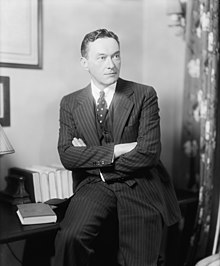Neoliberalism, also neo-liberalism, is a term used to signify the late-20th century political reappearance of 19th-century ideas associated with free-market capitalism after it fell into decline following the Second World War. A prominent factor in the rise of conservative and right-libertarian organizations, political parties, and think tanks, and predominantly advocated by them, it is generally associated with policies of economic liberalization, including privatization, deregulation, globalization, free trade, monetarism, austerity, and reductions in government spending in order to increase the role of the private sector in the economy and society. The defining features of neoliberalism in both thought and practice have been the subject of substantial scholarly debate.
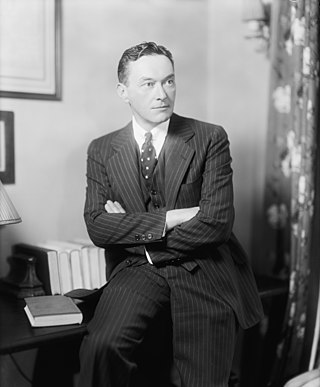
Walter Lippmann was an American writer, reporter, and political commentator. With a career spanning 60 years, he is famous for being among the first to introduce the concept of the Cold War, coining the term "stereotype" in the modern psychological meaning, as well as critiquing media and democracy in his newspaper column and several books, most notably his 1922 Public Opinion.

Alexander Rüstow was a German sociologist and economist. In 1938 he originated the term neoliberalism at the Colloque Walter Lippmann. He was one of the fathers of the "Social Market Economy" that shaped the economy of West Germany after World War II. He is the grandnephew of Wilhelm Rüstow, the grandson of Cäsar Rüstow and the father of Dankwart Rustow.
The Mont Pelerin Society (MPS) is a neoliberal international organization composed of economists, philosophers, historians, intellectuals and business leaders. The members see the MPS as an effort to interpret in modern terms the fundamental principles of economic society as expressed by classical Western economists, political scientists and philosophers. Its founders included Friedrich Hayek, Frank Knight, Karl Popper, Ludwig von Mises, George Stigler and Milton Friedman. The society advocates freedom of expression, free market economic policies and the political values of an open society. Further, the society seeks to discover ways in which the private sector can replace many functions currently provided by government entities.
The social market economy, also called Rhine capitalism, Rhine-Alpine capitalism, the Rhenish model, and social capitalism, is a socioeconomic model combining a free-market capitalist economic system alongside social policies and enough regulation to establish both fair competition within the market and generally a welfare state. It is sometimes classified as a regulated market economy.
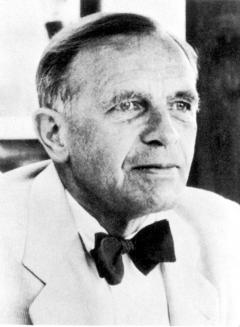
Wilhelm Röpke was a German economist and social critic, best known as one of the spiritual fathers of the social market economy. A Professor of Economics, first in Jena, then in Graz, Marburg, Istanbul, and finally Geneva, Switzerland, Röpke theorised and collaborated to organise the post-World War II economic re-awakening of the war-wrecked German economy, deploying a program sometimes referred to as the sociological neoliberalism.
Ordoliberalism is the German variant of economic liberalism that emphasizes the need for government to ensure that the free market produces results close to its theoretical potential but does not advocate for a welfare state.

The Foundation for Economic Education (FEE) is an American conservative, libertarian economic think tank. Founded in 1946 in New York City, FEE is now headquartered in Atlanta, Georgia. It is a member of the State Policy Network.
Philip Mirowski is a historian and philosopher of economic thought at the University of Notre Dame. He received a PhD in Economics from the University of Michigan in 1979.
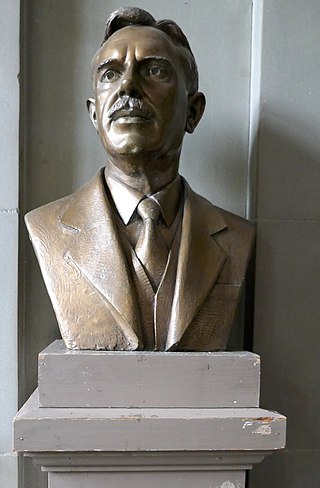
William Emmanuel Rappard was a Swiss academic and diplomat.

Jacques Léon Rueff was a French economist and adviser to the French government.

Ludwig Heinrich Edler von Mises was an Austrian School economist, historian, logician, and sociologist. Mises wrote and lectured extensively on the societal contributions of classical liberalism. He is best known for his work on praxeology studies comparing communism and capitalism.
Louis Auguste Paul Rougier was a French philosopher. Rougier made many important contributions to epistemology, philosophy of science, political philosophy and the history of Christianity.
The following outline is provided as an overview of and topical guide to libertarianism, a political philosophy that upholds liberty as its principal objective. As a result, libertarians seek to maximize autonomy and freedom of choice, emphasizing political freedom, voluntary association and the primacy of individual judgment.

Floyd Arthur "Baldy" Harper was an American academic, economist and writer who was best known for founding the Institute for Humane Studies in 1961.
Auguste Alburt Prudent Detœuf was a French economist, essayist, and industrialist.
The Birth of Biopolitics is a part of a lecture series by French philosopher Michel Foucault at the Collège de France between 1978 and 1979 and published posthumously based on audio recordings. In it, Foucault develops further the notion of biopolitics introduced in a previous lecture series, Security, Territory, Population, by tracing the ways in which the eighteenth-century political economy marked the birth of a new governmental rationality.
Louis Marlio was a French economist.
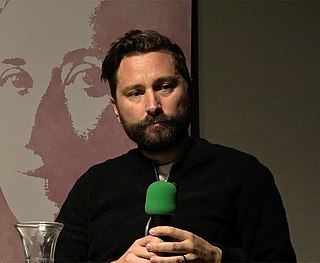
Quinn Slobodian is a Canadian historian of modern Germany and international history who has been Marion Butler McLean Professor of the History of Ideas at Wellesley College since 2022. He previously was a Residential Fellow at the Weatherhead Center for International Affairs, Harvard University in 2017–8.

Masters of the Universe: Hayek, Friedman, and the Birth of Neoliberal Politics is a 2012 book by barrister Daniel Stedman Jones, in which the author traces the intellectual development and political rise of neoliberalism in the United States and the United Kingdom. Originally a PhD thesis, the author adapted it into a book.
